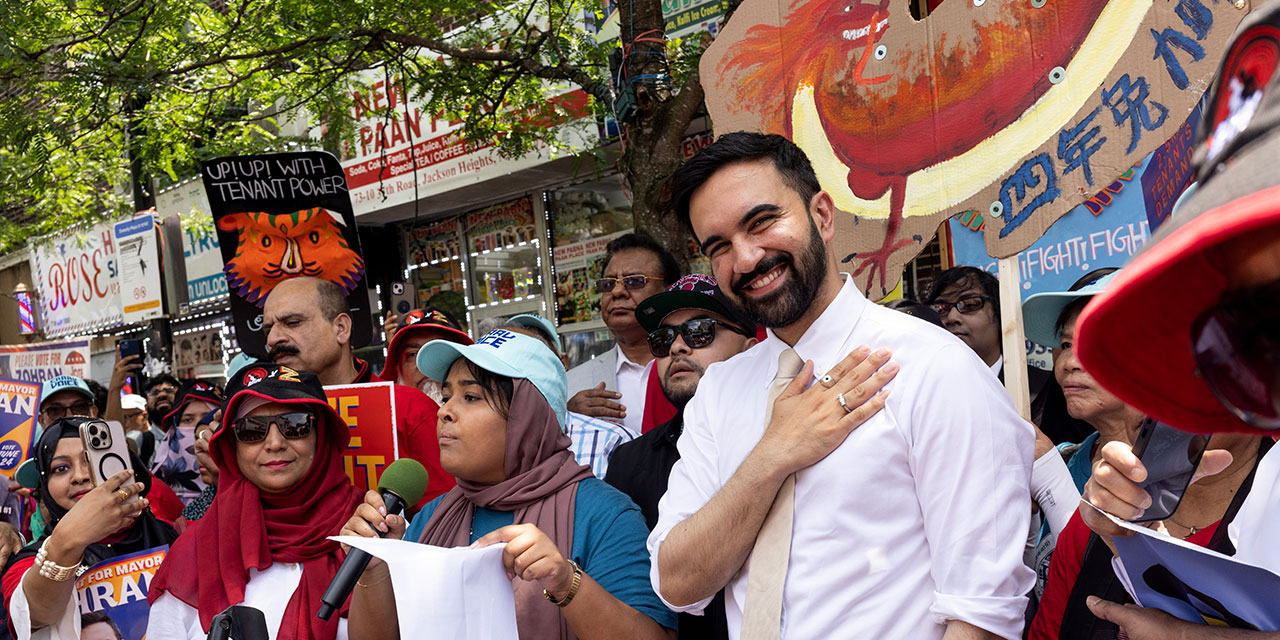
The unthinkable has happened in New York City. Zohran Mamdani—a 33-year-old avowed socialist who’s defended “globalizing the intifada,” championed city-run grocery stores, and argued that “queer liberation means defund the police”—has won the Democratic nomination for mayor.
For months, nearly every poll—including the Manhattan Institute’s—showed former governor Andrew Cuomo comfortably ahead in the race’s final ranked-choice round. Yet Mamdani not only surged at the finish line but did so decisively.
Finally, a reason to check your email.
Sign up for our free newsletter today.
It is an outcome so improbable that it risks being dismissed as a one-off or fluke. But make no mistake: this is a political event of national consequence. The only question is: what happens next?
Mamdani’s upset wasn’t just about late momentum or low-propensity progressives breaking late. The deeper truth is that many of us analysts were modeling the wrong electorate. Too many assumptions were borrowed from 2021, when Mayor Eric Adams put together a coalition of older black and Latino outer-borough Democrats and disaffected centrists.
That coalition did not show up on an excruciatingly hot primary day. In its place came a newer, younger, more ideologically disciplined Democratic electorate, college-educated and activated not by a desire to win back their city but to upend it.
The Mamdani coalition fuses the two most potent elements of the contemporary activist Left: the political style of the Democratic Socialists of America and the cultural performativity of “decolonization” discourse. Mamdani is fluent in both tendencies, deploying their tropes with the savvy of a charming TikTok influencer.
His appeal is also inseparable from the failure of New York’s political elite. After Mamdani announced his candidacy, most major donors and Democratic power brokers rushed to line up behind Cuomo—not because they loved him but because they assumed he was the only candidate with the juice to stop a leftist (Mamdani or any of the other candidates) from winning the mayor’s office. Cuomo was the known quantity, a battle-tested operator.
But in embracing Cuomo, the donor class made the same mistake they’ve made repeatedly in the Trump era: mistaking inevitability for invincibility. Cuomo had virtually no organic field operation. His campaign was powered almost entirely by name recognition and millions in Super PAC money, most of it dumped into late-stage attack ads. Many canvassers had to be paid—always a bad sign in a primary.
The result was predictable for anyone paying more attention to vibes than polling. Cuomo collapsed under the weight of his own baggage. Voters weren’t eager to rally around a man removed from office amid scandal just a few years ago. Even his loyalists seemed to know it.
The city’s moderate establishment—developers, financiers, gig economy barons—bet big on a candidate whom they didn’t particularly like and who was manifestly out of step with the electorate’s mood. Instead of building a younger, more credible alternative, they crossed their fingers and hoped for the best. It’s the same kind of elite short-sightedness that sponsors museum wings and endows university chairs but fails to cultivate real leaders.
So now what?
Cuomo, humiliated, is no longer a central player. He may still appear on the ballot in November via the “Fight and Deliver” independent line, but that is uncertain. Speculation abounds that he will drop out of the race.
There are murky legal waters here. If Cuomo were to decamp from New York City in the coming weeks, he could theoretically become disqualified under the city’s residency requirement. That would create a vacancy that his campaign’s designated committee might fill.
One plausible name floated for that scenario: Jessica Tisch, the NYPD commissioner and heir to a vast family fortune who could self-fund a portion of her campaign. She’s a hyper-competent technocrat in the Michael Bloomberg mold, with deep experience in government and rare bipartisan credibility. Praised by Cuomo, Mayor Eric Adams, Comptroller Brad Lander, and Republican mayoral nominee Curtis Sliwa alike, Tisch commands double-digit favorable ratings among likely voters and has kept a high profile in recent months. But unless Adams and Cuomo both get out of the way and agree on anointing her as the anti-Mamdani standard-bearer, it’s hard to see how a substitution gambit materializes in time.
That leaves three power players whose choices will shape the next four-plus months of city politics.
First is Donald Trump. The president grew disgusted by New York’s politics and has spent the past decade relishing his exile in Mar-a-Lago and the White House. But New York is still his hometown, and if he wants to stop the candidate he has described as “a 100% Communist Lunatic,” he may have the muscle to do it.
Last November, Trump won 30 percent of the city’s vote—more than any Republican mayoral candidate has earned since Ronald Reagan. He could endorse Sliwa. Or he could quietly offer Sliwa a creative federal post and clear the path for Adams.
The question is which narrative Trump prefers. Will he see a Mamdani mayoralty as a potent foil to run against in next year’s midterms? Or would he rather be the hero who once rescued the city from municipal dysfunction and returns to save it again?
The second player is Mamdani. He’s a serious political operator and an ideological hardliner, but not a fool. He surely knows that if he wants to become the Democratic Party’s most important new national figure, he may need to soften some edges.
There are already signs he’s trying. His campaign manager invoked broad coalition-building and even name-dropped the Manhattan Institute in a Primary Day press statement. (Mamdani himself ignored our invite to a policy briefing; Assemblyman, we’re happy to take a meeting any time.)
But if moderation is the strategy, he hasn’t quite internalized it. On the Bulwark podcast, Mamdani was given a golden opportunity to distance himself from the phrase “globalize the intifada”—a slogan that encourages violence against Jews worldwide. He didn’t dodge; he defended it, likening it to the Warsaw Ghetto uprising and insisting it simply reflected a yearning for equality.
The city’s political and philanthropic elites are the third key player. They can’t undo what’s happened, but they can still shape what comes next. If the goal is stopping Mamdani, someone—Adams, Tisch, whoever—must consolidate the majority of voters for whom Mamdani may yet prove too far-left.
Such an effort would require creativity, coordination, and realism. Mamdani’s base is energized, the progressive activist groups are unified, and the media oxygen is already his. He’ll be everywhere from now to November—cable segments, podcasts, Instagram videos. Unless he’s met by an equally strong counternarrative and a plausible counter-candidate, the general election will become a Mamdani coronation.
Photo by Andrew Lichtenstein/Corbis via Getty Images
Source link


















